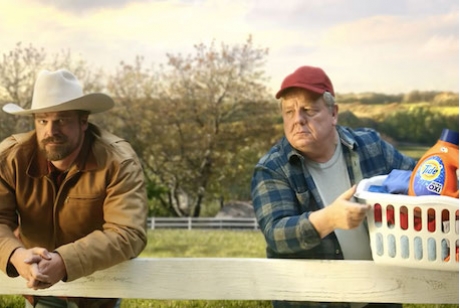Auskland - An advertising agency's success depends on two factors: making a valuable creative contribution to its clients' businesses and managing to turn a profit along the way.
On both counts Saatchi & Saatchi New Zealand had a monster year in 2006 and it can now claim another accolade: the NBR Advertising Agency of the Year award.
The agency's year in numbers would impress even its sharpest critics. It achieved a 25% increase in revenue and a 29% increase in profit. Annualised billings across Saatchi & Saatchi and Starcom increased 24% to $187 million.
Accounts-wise, losing Fonterra because of conflict in the Asian and Australian markets was offset by winning Hallensteins, Bendon and Fayreform, Sony Ericsson (through global alignment) and the Ministry for Culture and Heritage.
It's hard to believe that just three years ago Saatchi & Saatchi was haemorrhaging clients and billings and losing its creative reputation.
Enter chief executive Andrew Stone and executive creative director Mike O'Sullivan, brought in with a mandate to turn things around.
Mr O'Sullivan is deceptively laidback, with his friendly brogue and ever-present three-quarter-length shorts lending an air of casual approachability. He likes fishing a lot. He also appears to be rather good at marshalling his creative troops, as his wildly awarded tenures at both Saatchi & Saatchi and Colenso BBDO indicate.
In contrast, Mr Stone swears less and is a far more obvious workaholic, the arrival of various emails into this reporter's inbox at ungodly hours of the morning being a dead giveaway.
He is passionate about the agency and the Saatchi & Saatchi philosophy, as anyone who's met him - or just called his cellphone and been treated to a burst of Queen's We Will Rock You - can attest.
The pair have presided over a dramatic reversal of Saatchi & Saatchi's fortunes, well-supported by a team of executive talent including Jen Rolfe, Sonya Berrigan, Dean Taylor and Andrew Scott, who was famously poached from his position as chief executive of FCB just after he'd got his feet under the desk there.
No matter their role, everyone at Saatchi & Saatchi is charged with the same mandate: to make progress in the agency's self-imposed quest to transform from an advertising agency to an ideas company.
This is more than a juggling of syntax. The commitment expresses the agency's realisation that clients are looking for ideas to help foster their business, not ads.
A classic example is the "Starkish" campaign, which Mr O'Sullivan rated as one of his favourites of last year.
To launch a new vodka drink for client DB Breweries, Saatchi & Saatchi collaborated with Pead PR to encourage media personalities to use the word "starkish" on air.
The new word created a flurry of debate and interest, not to mention controversy when Jacqui Brown attracted criticism for using the word.
When the secret was eventually let out, Stark (as the vodka drink was called) was launched to a receptive and curious public - all for a miserly campaign cost of $12,000.
But that's not to say the agency is no longer using more traditional media to produce great campaigns.
Mr Stone rated the new Tui work as one of his favourites from 2006. Tui's "River" spot reached the top place on Admedia's top 10 television ads poll this month.
Throughout the year Saatchi & Saatchi excelled at important awards shows such as the Cannes Lions, where it picked up two golds, two silvers and a bronze.
Mr O'Sullivan said Saatchi & Saatchi's recent success showed how an agency's fortune travels in cycles - but he doesn't think his agency has peaked yet.
"We've still got lots of challenges ahead, as does the whole industry," he said.
Mr Stone added that if Saatchi & Saatchi judged itself on its old benchmarks, it would do well, but its new "ideas company" benchmark - and the higher standard of offer that this entails - has pushed the finish line further away.
The two agree that in such a quickly changing environment for agencies and their clients, there's no point in thinking that times are going to get any easier. "We need to be so aware of not only what's happening, but what's going to happen," Mr O'Sullivan said.
To achieve equal success in 2007, Mr O'Sullivan will need to ensure the smooth bedding-in of new staff in the creative department after an exodus at the end of last year.
On the Telecom front, the arrival of a new chief executive means fresh relationships will need to be built to maintain the agency's ties to the country's biggest advertiser.
Mr Stone said the change is good for outgoing CEO Theresa Gattung, good for the country and good for Telecom as an organisation, and Saatchi & Saatchi will continue to work hard on its behalf.
Source: The National Business Review 02.03.07













